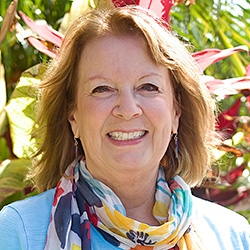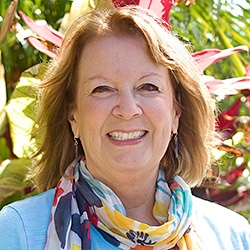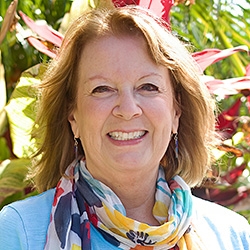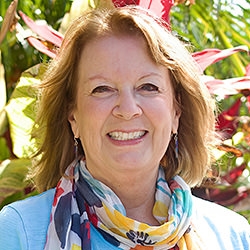

Search Results: fear
-
Trainer Tip: Let's start an abundance movement! We get great joy from contributing to others lives and allowing them to contribute to ours, let's not let fear get in the way.
-
Enjoy listening in as Arnina assists participants in fine tuning what they wish for their futures, and what practices they intend to embrace as the course winds down. She also offers strategies for what they can do if they forget their intended practice, and revisits the importance of untangling Needs from Core Belief.
-
Trainer Tip: It can be more productive and satisfying to focus on what we want than on what we don’t have or don’t like. What will help rectify the situation? What would you like someone to do now or next time? This can eliminate much of the emotional pain caused by berating yourself or others. The moment your focus is on what is wrong with your life or what's lacking, take a moment to shift it to what you want.
-
Transform inner messages rooted in childhood trauma, healing through compassionate connection.
-
Much like other asymmetric relationships (such as therapist and client), there are complications related to power dynamics that can arise with any NVC trainer having sex with a participant. For one, there's (counter)transference. And there's potential for things that may not move outside this asymmetric relationship -- such as projections where the participant, and/or the trainer, is guided by un-healed pain of their "inner child".
-
It's tempting to shut down a heated conversation when it’s painful and overwhelming. What can give us strength to stay open to hearing and being moved, to being open to new possibility, is recalling the “triad of conversation.” The triad is self and other and then awareness on the third side of the conversation. Here we can return to connection, to what we share and need in common, to a searching together for the way forward.
-
Ask the Trainer: Guidance for NVC groups on when and how to make requests, especially negative ones.
-
Trainer Tip: Accepting our true feelings, needs and values can lead us to a more compassionate life. Are you being true to yourself?
-
It is the first day of December and it seems to me as if 2023 went by with a flash. I have felt deep despair about the growing division between people and the devastating impact it has had on human beings, all life in fact, including our planet. And, I have also experienced many moments of joy and satisfaction this year.
-
When asking for support from another, you are most likely to enjoy receiving that support when the person giving support is giving from the heart—from a place of joy or delight. Inviting them to say "no" is a way of encouraging an authentic response, a response you can trust more fully.
-
Rejuvenate your inner world and relationships through deep self-empathy practices.
-
- Strengthen embodied awareness
- Integrate inner and outer worlds to create a connecting "corridor"
- Identify projected images that prevent connecting
- Embrace fear and transform reactivity
- Create a support network where you can express and be heard
-
- Focus on living from the inside out
- Bring a field of inner kindness to your inner distress
- Attend to your inner experience with compassion
- Cultivate an inner spaciousness of freedom
-
We’re in the throws of a particularly worrisome presidential election in the USA. Combined with world affairs and the global warming of our earth, we are seeing a level of despair higher than I ever remember experiencing.
As a result, the level of blaming others, judgments, dis-ease, and lack of trust that I experience or hear about every day is at an all-time high. I think there’s so much fear that we’ve begun lashing out at others, and rage is either visible or ever lurking.
-
Dear friends,
#UnlockYourAuthenticVoice
This has been on my mind lately. What does it mean to unlock my authentic voice? How do I talk about things that matter to me without creating emotional distance between myself and others? I’ve found this especially challenging after the US presidential election this month— half the voters are devastated by Donald Trump’s election, and the other half are elated. The extremes are vast. Sometimes imagining a coming-together feels hopeless.
-
Dear friends,
Happy April Fool’s Day, which, according to Wikipedia, “is an annual custom on April 1st consisting of practical jokes and hoaxes.” I always think of my Mom on April Fool’s Day. She was mostly a stern person who scorned practical jokes, but on April Fool’s Day, she would play hoaxes on my father. One year, she sewed his boxer shorts’ fly shut. Another year, she reorganized all the drawers in their bedroom. Both of these really made me laugh because it was so out of character coming from her! This April 1st, I do not want to play a trick on anyone, but I do want...
-
What's the real reason you choose to talk about something or not? "Privacy" can become a misplaced label that's used to hide harmful behaviour. Secrets typically come from reactivity -- and can carry shame, fear or threat of harm, and take a toll. And yet, if something private gets mislabeled as a "secret" it can also trigger shame and fear. The key to all this may be in relating to privacy from a place of clear differentiation, boundaries, agency, care and discernment.
-
Exploring how to share NVC in a school environment where others may not yet understand its value.
-
Explore compassionate ways to handle volatile counseling situations in dialogue form.
-
The American mythos of Independence Day is that liberty, equality, and opportunity are for all. Yet since the country's formation, these needs have been for some at the expense of others. It started with the brutal robbery and genocide of Native Americans and slavery of Africans. And this theme continued for generations in various forms, including how we related to other peoples, countries, and the ecosphere. To achieve true justice, liberty, and opportunity for all we may need to overcome the ego's sense of separation. Compassionate noncooperation may also be key.
Quick Links

Stay in Touch!
We value your privacy, won't share your email address and you can easily unsubscribe any time.


















